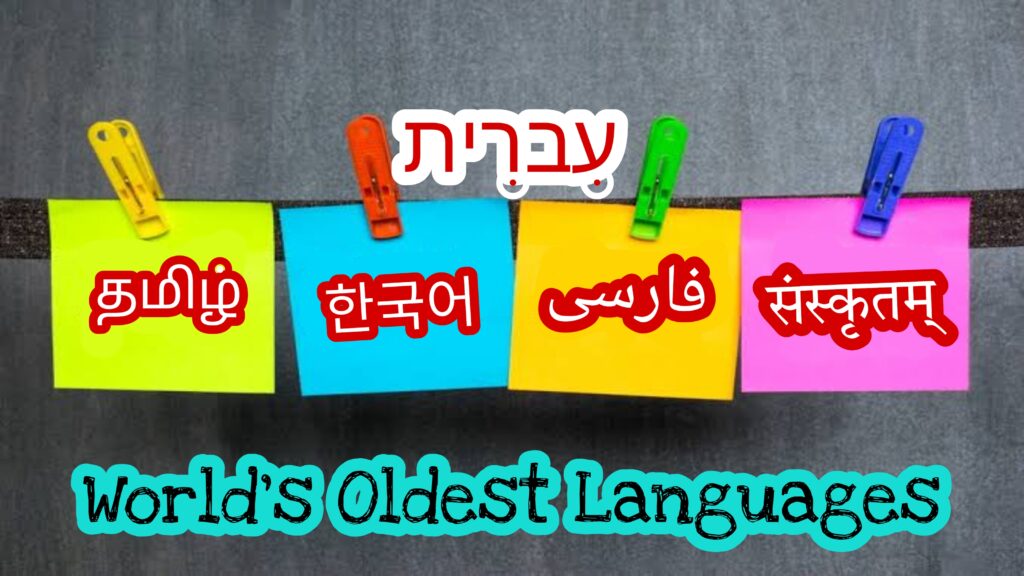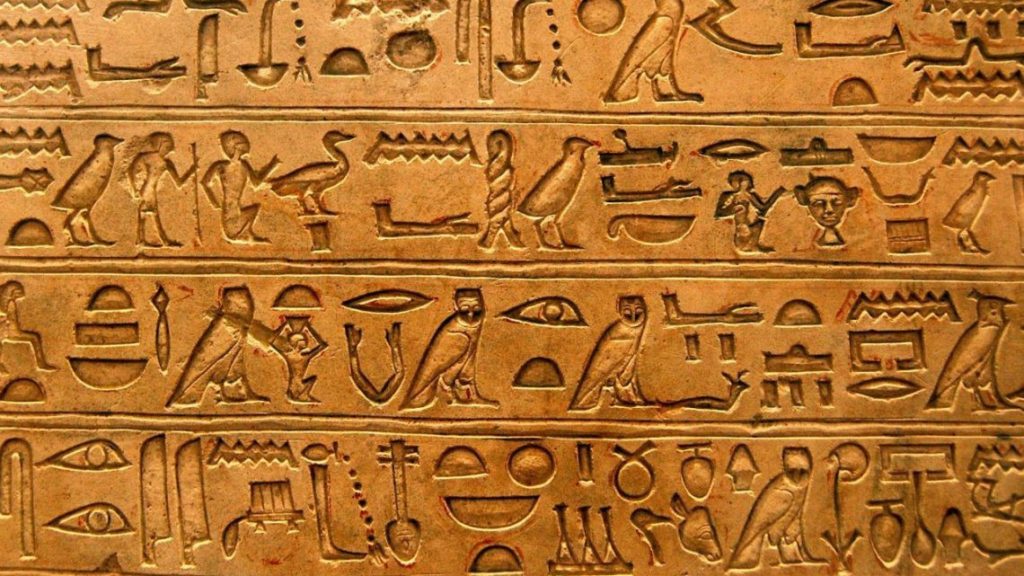Which is the oldest language in the world? You might have wondered what the real answer to this question is. Let’s look at the top 10 oldest languages in the world and find out the development of human conversation over the centuries.

Language has influenced human growth and, as a means of communication, it has facilitated conversation. Before the emergence of the language, human communication was done using hand gestures and primitive oral sounds. About 10,000 years ago, the idea of languages first developed, altering the path of human history.
There are many languages worldwide, some of which are now extinct, and few are still alive and in use. There are approximately 7000 languages spoken worldwide till now. Many scholars even find it challenging to identify the oldest languages in the world. You’ll be astounded to learn that numerous languages, which have been used for more than 400 or 4000 years, are still in use today.
Now, without wasting time, let us explore the top 10 oldest languages in the world.
List of the 10 Oldest Languages in the World
1. Sanskrit

Sanskrit is the language of three Indian religions — Hinduism, Jainism, and Buddhism. It is one of the most widely spoken languages in the world. Sanskrit, thought to be 4,000 years old (although some claim it is 6,000 years old), was once the most common tongue in India. Around 7000 people still use the Sanskrit language as their means of communication. A collection of Vedic Sanskrit hymns called the Rigveda, composed sometime in the second millennium B.C., contains the first known written record of Sanskrit.
Studies have shown that Sanskrit, one of India’s official languages, is one of the oldest languages in the world. Sanskrit appears to be the ancestor of all Indian languages because it gave rise to numerous others, including Hindi, Marathi, and many others. Sanskrit is also used in literature and music as the language of prayers and meditation.
2. Egyptian

It is known as the first language of the African continent. This language is widely spoken in Africa and Egypt and is 4700 years old. It is an ancient language, with written evidence of its use dating back to 3400 BC. Before Egyptian Arabic took its position in the late 17th century AD, when Muslims invaded Egypt, Coptic was the most widely spoken language in that country. The liturgical language at the Coptic Church in Egypt is still Coptic. Currently, more than 56 million people are fluent in the language.
3. Greek

The official language of Cyprus and Greece, Greek, is spoken by more than 13 million people globally. Homer’s writings were regarded in the seventh and eighth centuries. Greek is descended from Mycenaean Greek, a language that emerged some 700 years before The Odyssey was published. Approximately 3,500 years ago, the modern Greek language, spoken by 13 million people worldwide, began to emerge. Did you know that fields like astronomy and physics call for the assistance of translators who specialise in Greek? Greek has its significance and philosophy, from academic worth to a spiritual foundation.
4. Chinese

Chinese is one of the oldest languages in the world (3000 years), and its first written form is said to have arisen around 1250 BC. Cantonese and Mandarin translation services are also in high demand today. The reason? The development of the Chinese language spans multiple dynasties and dates back thousands of years. Distinct regions of China speak different dialects of Chinese. It necessitates that experts and even other officials properly deliver their services and products in a manner that consumers can comprehend and connect with. According to the most recent statistics, 1.24 billion people speak Chinese as their first language, including all of its dialects and variations, which is advantageous for many businesses.
5. Tamil

5000 years old in history, spoken by 78 million people, and is the official language of Srilanka, Singapore, and the Indian states of Tamil Nadu that has persisted into the current day. Tamil is the only ancient language that has survived to the present day. The oldest language in the world is Tamil, which is said to have descended from Proto-Dravidian, which was in use in the fourth millennium. However, it is impossible to establish this as no proofs were accessible at the time. The earliest records of this language date back to 300 BC. Tamil literature is extremely extensive and is considered classical.
6. Korean

Korean is the official language of both North and South Korea, yet there are differences in the two regions’ spelling, vocabulary, dialects, and even alphabets. The Middle Korean, often known as Hangul, is a distinctive Korean script developed by King Sejong the Great and his scholars and dates back to around the fifteenth century. But today, several nations, including Japan, Kazakhstan, China, Russia, Uzbekistan, and more, use Korea for several business-related purposes. For this reason, many organisations and business sectors globally require Korean translation services. This language has 77 million native speakers today.
7. Aramaic

Despite being one of the oldest languages in the world, it does not share Iran, Syria, Turkey, or Lebanon’s cultural traditions. This language uses both the Hebrew and Arabic alphabet. This language is believed to have been used by Armenians in ancient Syria around 1100 BC. Accordingly, this language has been around since the fourth millennium. It is the most ancient language still in use, according to many. Although the language is dying very fast, there are still more than 5 lakh speakers of the Aramaic language globally.
8. Hebrew

Around 400 CE, Hebrew began to lose its widespread use, but it is still used by Jews worldwide for religious ceremonies. Hebrew saw a renaissance era during the emergence of Zionism in the 19th and 20th centuries, eventually becoming Israel’s official language. Native Hebrew speakers can understand anything written in the old books, even though Modern Hebrew differs from the Biblical original. Other Jewish languages have a profound impact on modern Hebrew. There are currently 9 million people who speak modern Hebrew. 5 million out of 9 million individuals use it as their mother tongue.
Because many biblical terms come from the Hebrew language, many words were adopted into the English dictionary, like Amen, Sabbatical, cherub, Satan, Abracadabra, etc. If you want to learn more trivia about the Hebrew language and common phrases translated from English to Hebrew, you can read more about it.
9. Farsi

Farsi is among the oldest languages in the world, believed to be evolved somewhere between 525 to 300 BCE. In contemporary Iran, Afghanistan, and Tajikistan, Farsi is the primary language. Old Persian, the official tongue of the Persian Empire, is directly descended from Farsi. Around 800 CE, modern Persian began to evolve, and very little has changed till now. Persian speakers would have had less difficulty reading a work from the year 900 CE than an English speaker would have, for example, reading English texts from Shakespeare’s period.
10. Latin

Latin was the first script to appear after the Old form, around 75 BC. It is a classical Indo-European language that descends from the Italic family. Initially, Lazio—the areas in and around Rome—spoke Latin as their primary language. Considering Latin to be a valuable language at the time, the Roman Empire resolved to make it a formal language. And today, Poland and Vatican City are considered to have Latin as their official language.
Which are the most ancient languages in the world?
Following are the oldest languages in the world:
| Languages | Native To |
| Sanskrit | India |
| Egyptian | Egypt |
| Greek | Greece |
| Chinese | China |
| Tamil | India |
| Korean | Korea |
| Aramaic | Iraq |
| Hebrew | Israel |
| Farsi | Iran |
| Latin | Italy |
These were the top ten oldest languages in the world. Languages are undoubtedly a great gift to us and the best one. We can communicate everything we desire orally, in writing, or through sign language because of these languages. It’s incredible to learn that most of the languages described above are still in use and spoken by millions worldwide.
If you have any questions regarding the oldest languages in the world, kindly do let us know on feedback@gangatimes.com.
Also Read: How to say ‘Thank You’ in 50 languages?
Keep visiting The Ganga Times for such beautiful articles. Follow us on Facebook, Twitter, Instagram, Tumblr, and Koo for regular updates.
